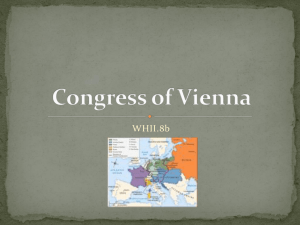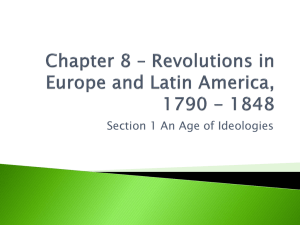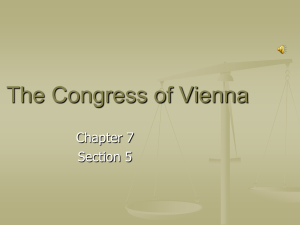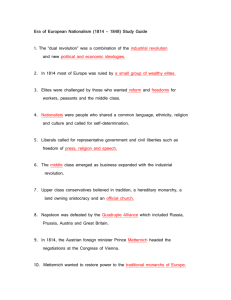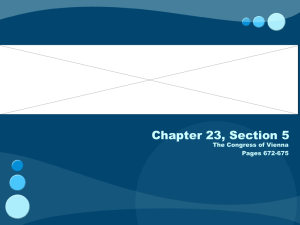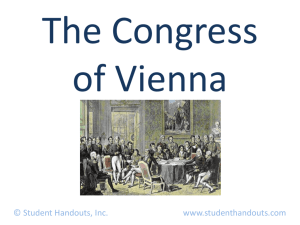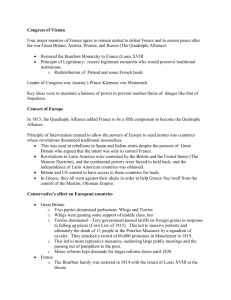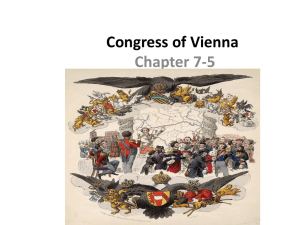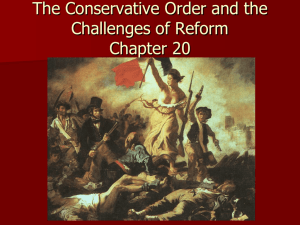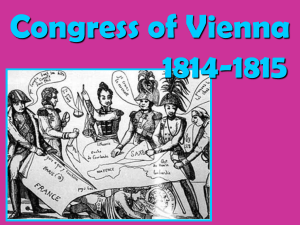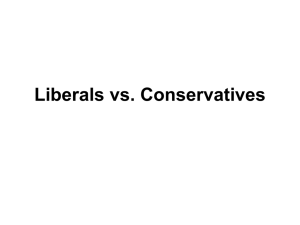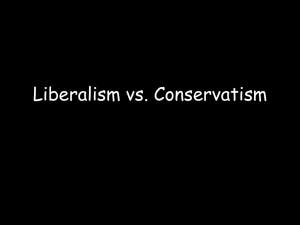Ch.20 The Conservative Order and the Challenges of Reform (1815
advertisement
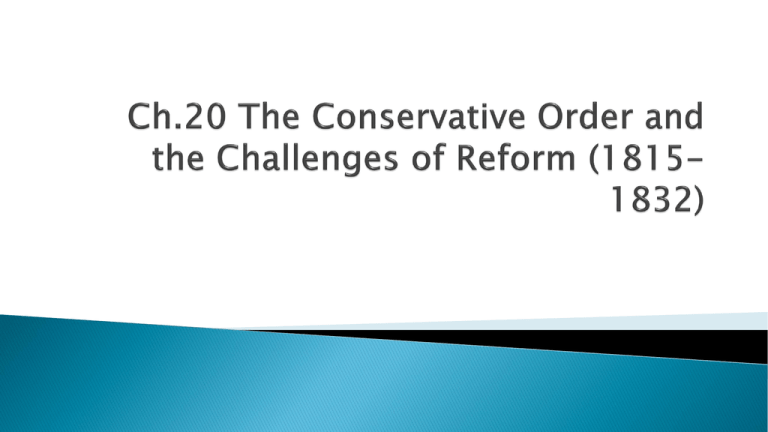
Congress of Vienna Early nineteenth century nationalists opposed Congress of Vienna Did not allow for individual representation of ethnic groups Upheld monarchies and dynasties in its redistribution Liberal (defined by Conservatives)- anyone or anything that challenged their own political, social, or religious values 19th century liberals influenced by Enlightenment writers and French Revolution: Desired: ◦ ◦ ◦ ◦ Legal Equality Religious toleration Freedom of Speech Economic Freedom (Adam Smith- Lassiez Faire) 19th Century Conservatism- dominated by monarchies, landed aristocracies, and established churches These groups united over resistance to change Slow progress of nationalism and liberalism Austrian Prince Metternich (embodied conservatism) believed that recognizing minority rights would destroy his empire Frederick II of Prussia- reneged on his pledge to create constitutional government and resisted aspirations by German nationalists to dissolve conservative order Students in Southern Germany React- Form student groups called Burschenschaften to address goal of unified Germany Lord Liverpool focused on issued of elite and landowners instead of common citizen (this made them angry) Coercion Act of March 1817- suspended the rights of habeas corpus and discouraged free speech. Peterloo Massacre (1819)- Liberal crowd gathers in Manchester Saint Peter’s Fields. Militia moved in and crowd panics. 11 people die and several are injured Six Acts- Designed at intimating agitators and limiting their free speech Bourbon Restoration brought Louis XVIII to throne after Napoleon’s abdication. Issues a constitution known as the Charter that gave monarch greater control over government leaders. Maintained the Declaration of Rights and Man Citizen Did not challenge property rights of land confiscated by the Aristocracy and Church Louis XVIII moderate charter angers royalists (conservatives) who carry out attacks on Napoleon's allies 1820 Duke of Berri is assassinated. Royalists persecute liberal Louis XVIII responds with more repressive measures that gave royalists and conservatives greater power Concert of Europe- informal meetings with European powers after Congress of Vienna 1820- Concert begins failing with Spanish Ferdinand VII of Spain violates his promise to govern according to constitution 1820s- Revolution occurs in Naples and begins to spread across Italy Worries Metternich (Austria) threatens to spread to Austria Metternich sought help to suppress movement from other powers Protocol of Troppau- Russia, Prussia, (unofficially from France and Britain)- agreement that stable governments could intervene in countries experiencing a Revolution to restore order All interventions that occurred through the congress system sought to maintain the international order achieved after Congress Vienna Greek Revolution of 1821 1830 Fight for Serbian independence ◦ Demonstrated the growing issues of nationalism and liberalism Wars for Independence: Latin American countries cut ties with European powers ◦ Venezuela, Mexico, Paraguay, Uruguay, Argentina Russian officers who fought Napoleon were exposed to ideas of Enlightenment grew sympathetic to reformists movements Two Secret Societies were Formed: Northern and Southern Society Societies unite to carry out coup d'état in 1826 Decembrist Revolt- Russian army swear allegiance to new Tsar Nicholas, Moscow regiment refused. Nicolas had artillery attack them Symbolized to Russian liberals the oppressive conditions of life under tsars Nicolas conservative authority when Poland nationalists agitated for change In 1830 Charles X was new King Favored aristocrats and ultra-loyalists Restored rule of primogeniture, supported the Catholic Church, and gave special rights to the descendants of émigrés Liberals gained enough seats in the Chamber of Deputies in 1827 to override some of Charles’s new Laws Elections of 1830 Charles attempted to seize power from Liberals July Monarchy- Parisians responded by staging massive protests Charles X turned troops against them Charles X fails and departs in August for exile Louis Philippe’s becomes king of France and focuses on his new role
